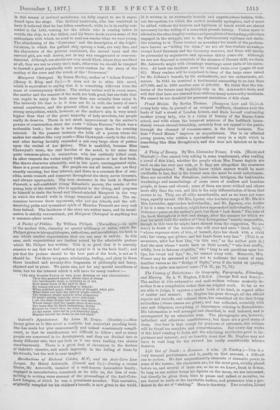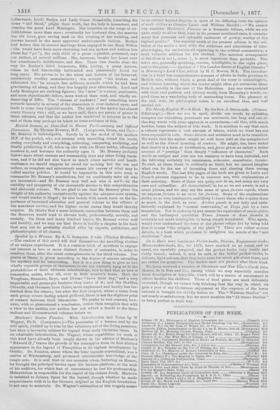LVe Out of Death : a Romance. 8 vols. (S.
Tinsloy.)—Titis is a very unequal performance, and is, partly on that account, a difficult one to review. We find unquestionably elements of dramatic power in some of the scenes ; the characters aro, for the most part, vividly placed before us, and several of them are, so far as we know, fresh to fiction. So long as our author keeps his figures on the move, we are interested,, but directly ho gives them time to pause and reflect or moralise, we are forced to smile at the inevitable bathos, and pronounce him a pro- ficient in the art of "sinking." Here is the story. Two cousins, Lionel (afterwards Lord) Roslyn and Lady Grace Grandville, inheriting the same "bad blood," plight their troth, but the lady is inconstant, and marries the great Lord Montagne. She trembles on the verge of un- faithfulness more than once ; eventually her husband dies, she marries her old lover, goes raving mad on the evening of her wedding, and drowns herself in the most approved melodramatic fashion. Roslyn had before this ill-starred marriage been engaged to one Mary Wilton (who would have been more charming had she spoken and written loss about her " pa"), the only child of a groat capitalist, possessed, says our author, of sereral millions. She, however, breaks her heart over her sweetheart's indifference, and dies. Those two deaths clear the way for Roslyn's third inamorata, Effie Linley, a great actress, whom he had honourably befriended and platonically loved for long years. She proves to be the niece and heiress of the bereaved, enormously wealthy manufacturer ; • she accepts "his broken and exhausted life," he accepts her millions, towards which he had been gravitating all along, and they live happily ever afterwards. Lord and Lady Montague are striking figures; the "hero" is a crazy, passionate, and most objectionable fellow, more wicked than mad, and wholly un- deserving of Effie. The "stream of tendency and something more towards insanity in several of the characters is over-insisted upon, and leads to some very frightful results. The style of the author has :limpet every literary vice; still, as WO have said, there are points of power in these volumes, and that the author has contrived to interest ne to the end of them may perhaps be taken as some evidence of this.







































 Previous page
Previous page